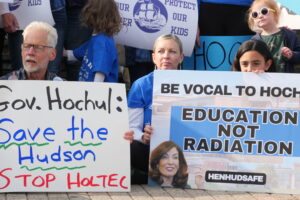All of us have seen them: the after school specials with McGruff the Crime Dog telling kids to "Take a Bite Out of Crime;" Public service announcements encouraging kids to live "Above the Influence;" and Truth commercials revealing astonishing facts about cigarettes.
 |
|
Alex Noble |
All of these efforts, as well as many others, have the same regurgitated message: Just Say No. But is telling kids to "just say no," enough to help them understand the dangers of substance abuse? The Teen Task force does not think so.
Alex Noble, 18, is the proponent of the Teen Task Force, an Irvington-based organization consisting of himself, and his "two partners in preventing crime" – Daniel Miller and Matt Grossback. Their mission: to create sensible policies towards teen drinking and drug use.
After witnessing his peers’ great misuse of alcohol, Noble decided it was time to revise the current programs and policies that local schools and governments are implementing in the community. The trio began their effort this year working as interns for Town Supervisor, Paul Feiner. During the course of their internship, they created a television documentary about teen substance abuse within the town of Greenburgh. With what began as just a documentary on teen drinking and drug abuse, the Teen Task Force turned their television show into a forum for teens to speak out concerning the policies and programs used in their school.
"Kids have had no input into the policies of school or government on any kind of scale," explains Noble. "I think the big thing we can do with our documentary is to give kids the voice that they’ve always wanted."
After interviewing a number of figures around the Westchester community, such as Sergeant Mike Foley of the Irvington Police Department and Barrett Seaman, the author of "Binge: Campus Life in an Age of Disconnection and Excess" (John Wiley and Son, 2005), Noble says that what they found was one consistent pattern: no one has really taken a fresh look at the underlying policies that prevent kids from drinking and how effective they are. Rather, the only kind of policy that schools and governments practice is strict enforcement which Noble believes is creating this backlash of binge drinking.
"There is one thing that happens with stricter enforcement: kids are so motivated that no punishment is going to deter them. Maybe you might get a few kids on the edges, but the core group that is going to do it, is going to do it regardless."
Therefore, Noble along with his comrades have put forth a new kind of policy which begins at home. One of the main problems with the policies that have been put forth is that they have made the topic of drinking "taboo." This has built a barrier between parents and their kids and Noble says that this exact attitude is what has been forcing kids to drink excessively in secret.
"Kids should be able to consume alcohol in their homes where they can do it responsibly and safely, not in the woods where Joe six pack is coming out and he’s got a bong and a hookah in his hands and he’s got 40’s on his feet," Noble argues.
"The effect [of introducing alcohol in the home] that a parent would think is, ‘my permissive attitude would make my kid more likely an alcoholic.’ The fact is it’s going to demystify alcohol, which has been put up on a pedestal by having it be illegal…We need to stop sensationalizing and attaching a negative value to alcohol. It shouldn’t be a good thing or a bad thing. It can be used or abused. And I think that’s the main thing we can convince parents of. "
The other catalyst of teen alcohol abuse is the very common perception of teens that everyone is drinking. To prove this idea to be false, the Force created a survey through surveymonkey.com and advertised it through the social network, facebook.com. The survey was completed anonymously by Irvington High School students, as well as students from Dobbs Ferry, Ardsley, Sleepy Hollow and outside of Greenburgh. And the results were startling.
"We asked the question: What percentage of your friends drink? We had percentages as options and the vast majority of 82% of people said that they believe 80-100% of their friends drink (that was the most common statistic). But what we found is only 30% drink."
So how can this information be useful in the quest to fight teen substance abuse? Noble suggests applying the social norm technique, a marketing tactic which states that humans will act based on what they perceive to be the norm for the rest of society. When applied to this situation, it states that kids will act the way they think is the norm for the rest of their peers.
"What our data suggests is that kids think, literally, that everyone is drinking. But in reality, the number is much lower. So if you publicize, if you market to kids the actual number of kids who are drinking they’ll say, ‘Wow, only a third of kids actually drink? I thought it was 100%; it’s not normal to drink five-plus drinks on the weekend, so I’m not going to do it as much,’" reasons Noble. "It sounds like a great idea and the evidence suggests that it’s a really effective way to bring down the rates of drinking."
Overall, Noble’s message to parents, officials and educators is, to keep an open mind. "I think if we can convince one school to reassess their approach, one parent to reassess their approach, one government to say, ‘let’s create a policy review board and take a real look at what other counties, other towns, and other states are doing, to prevent kids from drinking,’ it’s all worth it."






